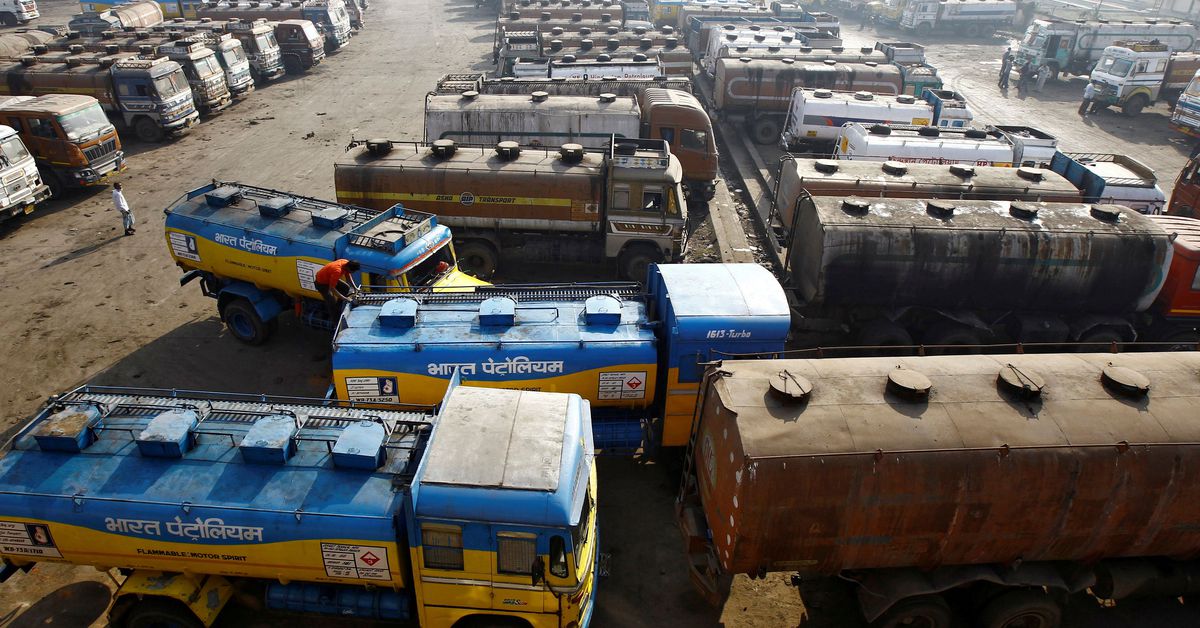India’s future crude oil supplies will mostly come from Gulf -oil minister

Oil tankers are seen parked at a yard outside a fuel depot on the outskirts of Kolkata February 3, 2015. REUTERS/Rupak De Chowdhuri
MILAN, Sept 5 (Reuters) – India’s minister of petroleum and natural gas, Hardeep Singh Puri, said most of his country’s crude oil supplies in the near future will come from the Gulf countries, including Saudi Arabia and Iraq, as it seeks a secure and affordable energy base.
Indian refiners have been snapping up relatively cheap Russian oil, shunned by Western companies and countries since sanctions were imposed against Moscow for what it calls a “special military operation” in Ukraine.
India’s imports from Russian oil rose by 4.7 times, or more than 400,000 barrels per day, in April-May, but fell in July.
Register now for FREE unlimited access to Reuters.com Register
Crude oil imports from Saudi Arabia by the world’s third biggest oil importer and consumer rose in July by more than 25% after Saudi Arabia lowered the official selling price in June and July compared with May. Saudi Arabia stayed at the No. 3 spot among India’s suppliers. read more
“As far as India is concerned, I see for the foreseeable future much of our crude oil supplies will be coming from Saudi Arabia, Iraq, Abu Dhabi, Kuwait, among others,” Puri told Reuters in an interview on the sidelines of the Gastech conference in Milan.
Although oil imports from Russia declined by 7.3% in July from the June levels, Moscow remained the country’s second biggest oil supplier after Iraq.
Puri said that by the end of the fiscal year on March 31, 2022, India’s purchases from Russia represented only 0.2%, but rose later as the global situation became “problematic”.
“We started to buy a little more, but we still buy a fraction of what Europe buys from Russia. A democratically elected government like what we have in India will make sure that the consumers are provided with energy (not only) on a secure basis, but also on an affordable base,” he said.
Asked if future purchases of Russian oil would rise or decline, Puri said he wouldn’t rule out anything.
“When prices are high, the logistical factors are applied. We have a duty to our consumers.”
European countries and the United States have imposed heavy sanctions on Russia since Moscow sent troops into Ukraine on Feb. 24. New Delhi has called for an immediate ceasefire in Ukraine, but it has not explicitly condemned the invasion.
While Prime Minister Narendra Modi’s government values good relations with Washington and the West, Indian officials say domestic needs come first and argue that Russia has been a better friend than the United States in energy cooperation.
Puri said the rise in global energy prices is not directly linked to the war in Ukraine but rather to the “misaligned equilibrium between supply and demand,” with the geopolitical situation an additional factor.
Asked if he would support a price cap on Russian oil, Puri said they will examine the issue once more details are available.
Register now for FREE unlimited access to Reuters.com Register
Reporting by Marwa Rashad; Editing by Leslie Adler
Our Standards: The Thomson Reuters Trust Principles.






